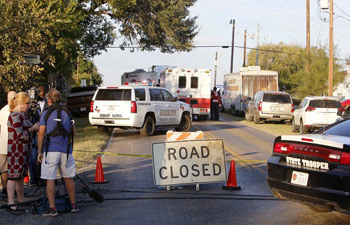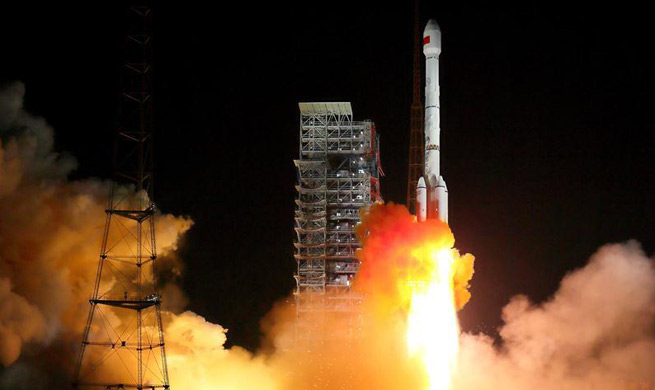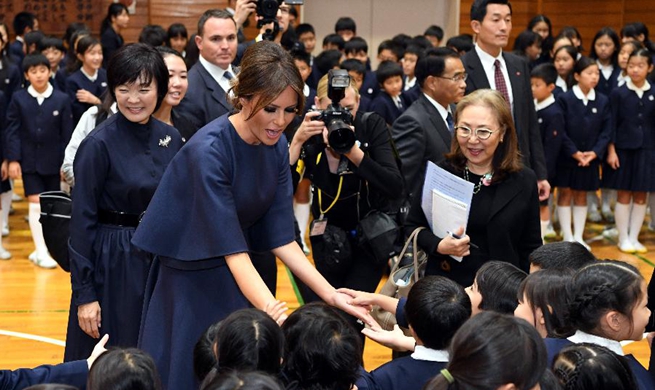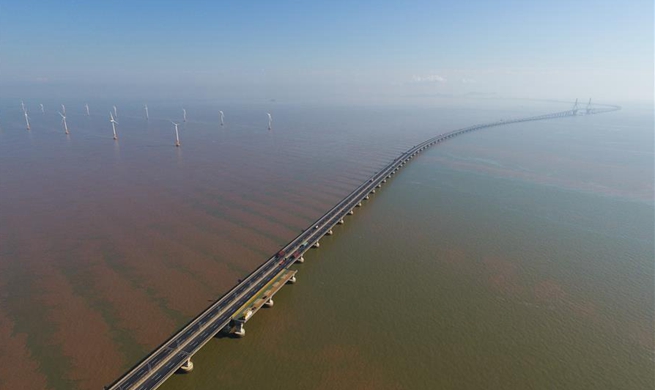by Xinhua writers Gao Pan, Yan Liang
WASHINGTON, Nov. 5 (Xinhua) -- Jerome Powell, U.S. President Donald Trump's nominee for the next chair of the Federal Reserve, will face three new economic challenges to lead the central bank, a leading U.S. economist has said.
Trump last week picked the 64-year-old Federal Reserve Board member Powell to succeed current Fed chair Janet Yellen, whose term expires in February. The decision was widely expected and welcomed by financial markets, as Powell could continue Yellen's gradual and cautious approach in tightening monetary policy if confirmed by the Senate.
"I think it's actually very good that Powell got the job," said Adam Posen, president of the Peterson Institute for International Economics, a Washington-D.C. based think tank.
"The president chose to take someone from the mainstream" who was not attacking the Fed's previous successful policies and would not impose some crazy rules that would raise interest rates a lot for no reason, Posen said in a recent interview with Xinhua.
While Powell is known for being a moderate and consensus builder, there are some common challenges that are true for every Fed chair, said Posen, a former policymaker at the Bank of England.
"Every Fed chair has to figure out how to work with the committee which includes people at the reserve banks outside of Washington and they're independent people," Posen said, referring to the Fed's policymaking committee.
Meanwhile, "every Fed chair has to have a good story to Congress about why they're doing and what they're doing," he said, noting Powell, a new Republican appointee, will have some support in the Republican-controlled Congress.
While Powell will inherit a healthy U.S. economy and a booming stock market, there are three new economic challenges facing Powell after taking the helm of the central bank, said Posen.
Firstly, U.S. "inflation has not come back as strongly as people expected," he noted, adding the connection between the unemployment rate and wage inflation has been "very weak".
Despite of a very low of 4.1 percent unemployment rate in October, U.S. inflation remains stubbornly below the central bank's target of 2 percent.
"So one challenge for Powell and the Fed is to figure out how much they can count on inflation coming back versus not and that determines how fast they raise rates," said the economist.
Posen said the second challenge is in the area of financial supervision and banking regulation, as even Yellen said this summer that "there's some room to roll back some of the regulations that were put on after the crisis."
"So deciding how far to roll that back, how much is done under the authority of the Fed versus how much is done in cooperation with Congress or others, that's a big challenge," he said.
The third challenge will be for Powell and the Fed to decide "how aggressively they want to respond to the fiscal policy", as Republicans in Congress are poised to increase fiscal deficits through a big tax cut when the United States is close to full employment, said Posen.
"I think they're actually reluctant to tighten very much at least initially because they want to give the Trump policies a chance," he said.
Posen said the long-awaited tax bill that the House Republicans unveiled last week was much more about tax cuts than reform, with corporate income tax rates slashed to 20 percent from 35 percent.
"It really is all just about these big tax cuts to business, and that's not a great idea," he said, warning the tax cuts would lead to a rise of U.S. fiscal deficits and public debt.
"The big picture is you're adding 150 to 200 billion (U.S. dollars) a year to the deficit, meaning three quarters of a percent of GDP or more every year for the next 10 years at a time when we're at full employment," he said.
"My belief with the kind of deficits that we're going to get from the taxes is that the U.S. economy will go through another little boom and bust cycle," he argued, predicting the U.S. economy will likely see another recession at the end of 2020 or early 2021.
Fed policymakers are concerned that the central bank's target interest rate won't be high enough to leave much room for cuts in response to the next economic downturn.
Yellen said last month the Fed must recognize that they might have to use quantitative easing policies again as "a significantly less severe economic downturn than the Great Recession might be sufficient to drive short-term interest rates back to their effective lower bound."
But it remains unknown how Powell, who will be the first Fed chair without a Ph.D. in economics since 1980s, would well manage an economic crisis that might arise over the next four years.
Powell obtained an A.B. in politics from Princeton University in 1975 and earned a law degree from Georgetown University in 1979.
He previously served as undersecretary at the Treasury Department in the George W. Bush administration in early 1990s and was picked by then President Barack Obama as Fed governor in 2012.
















